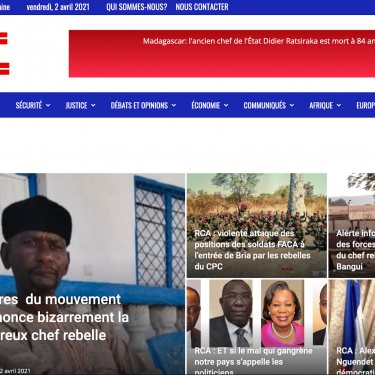RSF decries arbitrary blocking of two CAR news websites

As the Central African Republic continues to grapple with a surge in violence that began last
December, Reporters Without Borders (RSF) calls on the authorities to restore access to two
news websites that they have been blocking since mid-February, a few weeks after President
Faustin-Archange Touadéra’s disputed reelection.
The Corbeau News and Le Tsunami were given no warning when the ministry of posts and telecommunications instructed Internet operators on 16 February to cut access to their websites “until further notice” on the grounds that they had spread “hate speech” and fake news amid a “security crisis.” The ministry mentioned no specific article or post.
The website’s editors were not consulted or informed about the decision and RSF was unable to reach the minister. The president of the High Council for Communication (HCC) – which is supposed to be responsible for regulating the media, including online media, and is the only government agency empowered to take this kind of decision – told RSF that he “learned about it on the street like everyone else in the CAR.” At no point was the HCC consulted.
Corbeau News publisher Alain Nzilo told RSF he thought the blocking was designed to prevent his site from revealing sensitive information, especially about the presence in the CAR of Russian mercenaries working for Wagner, a privately-owned security company with Kremlin links. The CAR authorities insist that there is no Wagner presence in the country.
Nzilo said that Russian paramilitaries have repeatedly contacted him with the aim of getting him to change his editorial policies. Le Tsunami publisher Edouard Yamalet told RSF that it was Russian officials in the CAR who were responsible for getting his website blocked after it published several articles referring to “war crimes” by Wagner’s mercenaries.
“This decision was completely arbitrary,” said Arnaud Froger, the head of RSF’s Africa desk. “It was not based on anything specific and the way it was taken violated all elementary principles and procedures in place, including those concerning the media regulator. Blocking these sites just further undermines media coverage, which is already very difficult because of the very unstable security situation in this country at war and because the media are often the hostages of interests and forces on the grounds. We call on the authorities to restore access to these two sites at once and to allow media and journalists to operate freely.”
In an interview for Radio Bangui FM last month, Russian ambassador Vladimir Titorenko denied the presence of Russian mercenaries in the CAR and accused media funded by the armed opposition of spreading false information on the subject. But on 31 March, a group of UN- appointed independent experts voiced concern about “reports of grave human rights abuses” by Russian paramilitaries in the CAR.
These press freedom violations come against a political backdrop marked by controversial parliamentary and presidential elections and a surge in attacks on the CAR authorities by a rebel coalition – an environment that makes it very difficult for the media to function. In January, the authorities urged journalists to “participate in the war effort” through their reporting. At the same time, it is very hard for them to travel outside the capital, Bangui, and sometimes the authorities prevent them from leaving Bangui altogether. Reporters are often forced to rely on NGOs to try to investigate the situation in areas controlled by armed groups.
The CAR is currently ranked 132nd out of 180 countries in RSF's World Press Freedom Index.


